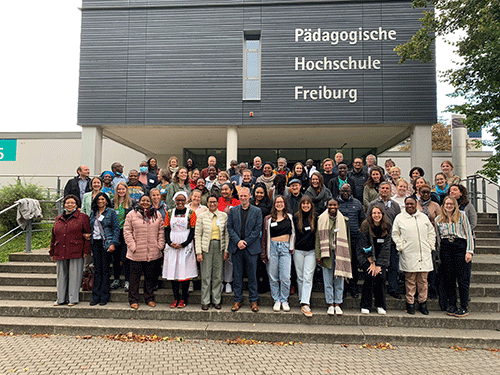NUDO president Esther Utjiua Muinjangue says transgenerational trauma does not leave physical marks but psychological or emotional scars, which make it difficult to recognise, allowing the cycle to continue.
She said this in Freiburg, Germany, while addressing conference participants and students from the University of Namibia and Freiburg University of Education.
The institutions organised a conference under the theme, ‘Towards Humanising the Future. Justice in the Shadow of Colonialism. A Transformative Learning Approach’.
Muinjangue, a social worker by profession, stated that genocide, which is one of the worst forms of violence, has generally led to horrific socio-economic and psychological impacts.
“Transgenerational trauma has been identified in the descendants of slaves, refugees and children of Holocaust survivors – and one does not need to directly experience trauma to be affected by it. Anyone related to someone with the traumatic experience – whether in the same generation, immediate family or subsequent generations – can experience symptoms,” she stated.
Common symptoms of intergenerational trauma include low/poor self-esteem, insecurity, depression, anxiety, insomnia, anger, self-destructive behaviours, dissociation, division, numbing, lack of trust/difficulty trusting others, frustration or irritability, anxiety and depression, and unreasonable fear of injury or death.
Muinjangue said: “As an Otjiherero-speaking Namibian, a descendant of a community that experienced a genocide, a community that was exposed to Apartheid, I can say with confidence that I recognise many of the warning signs in the Ovaherero people”.
She added: “This makes one believe that the traumatic experiences (rape, torture and all other genocidal acts that the Ovaherero people were exposed to) have been passed on from generation to generation”.
Muinjangue said the genocide dates back to 118 years, and the living descendants are in the third/fourth generations.
To date, she has never come across empirical evidence on how the immediate survivors of the 1904/08 genocide benefitted from any holistic health programmes or services.
“However, various studies demonstrate particular long-term consequences of massive organised violence, such as war and genocide, on mental health and psychosocial conditions,” she said.
Muinjangue noted that a practical example would be Rwanda, where differences between families of survivors and families of former prisoners, accused of participation in the Rwandan genocide, are reflected in the mental health of the next generation.
“This is trans-generational or intergenerational trauma; the psychological theory suggests that trauma can be transferred between generations. After the first generation of survivors experiences trauma, they can transfer their trauma to their children and further generations of offspring via complex post-traumatic stress disorder mechanisms. In other words, transgenerational trauma is when the experiences of parents affect the development of their children – and sometimes, even their grandchildren. That is what makes it difficult for people to get over their past,” she said.
Muinjangue challenged conference attendees, specifically the students, to engage in more research exercises to assess health-related consequences, specifically the psychological impact of genocide, especially on the Ovaherero and Nama.
- psiririka@nepc.com.na


